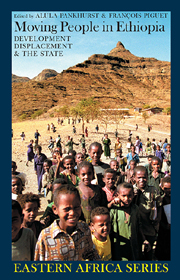Book contents
- Frontmatter
- Contents
- Acknowledgements
- Acronyms
- Glossary
- Notes on Contributors
- Preface: An Original Contribution to Country-wide Displacement Analysis
- Foreword by Alula Pankhurst & François Piguet
- Map
- Part I INTRODUCTION
- Part II THEORETICAL & INTERNATIONAL PERSPECTIVES
- Part III DEVELOPMENT-INDUCED DISPLACEMENT
- 4 Social Dimensions of Development-Induced Resettlement
- 5 The Effects of Development Projects on the Karrayu & Afar in the mid-Awash Valley
- 6 The Effects of Investment on the Livelihoods of the Tsamako in the Wayto Valley
- 7 Planning Resettlement in Ethiopia
- 8 Urban Development & Displacement of Rural Communities around Addis Ababa
- Part IV THE EXPERIENCE OF STATE-ORGANIZED RESETTLEMENT
- Part V THE DILEMMAS OF REFUGEES, RETURNEES & DISPLACED GROUPS
- Part VI CONCLUSION
- Bibliography
- Index
- EASTERN AFRICAN STUDIES
6 - The Effects of Investment on the Livelihoods of the Tsamako in the Wayto Valley
from Part III - DEVELOPMENT-INDUCED DISPLACEMENT
Published online by Cambridge University Press: 05 April 2013
- Frontmatter
- Contents
- Acknowledgements
- Acronyms
- Glossary
- Notes on Contributors
- Preface: An Original Contribution to Country-wide Displacement Analysis
- Foreword by Alula Pankhurst & François Piguet
- Map
- Part I INTRODUCTION
- Part II THEORETICAL & INTERNATIONAL PERSPECTIVES
- Part III DEVELOPMENT-INDUCED DISPLACEMENT
- 4 Social Dimensions of Development-Induced Resettlement
- 5 The Effects of Development Projects on the Karrayu & Afar in the mid-Awash Valley
- 6 The Effects of Investment on the Livelihoods of the Tsamako in the Wayto Valley
- 7 Planning Resettlement in Ethiopia
- 8 Urban Development & Displacement of Rural Communities around Addis Ababa
- Part IV THE EXPERIENCE OF STATE-ORGANIZED RESETTLEMENT
- Part V THE DILEMMAS OF REFUGEES, RETURNEES & DISPLACED GROUPS
- Part VI CONCLUSION
- Bibliography
- Index
- EASTERN AFRICAN STUDIES
Summary
Following the assurance problem approach (Bromley and Cernea 1989), the present chapter argues that, in a region where people are ‘critically dependent on natural resources with low and uncertain incomes’, customary tenure rules are efficient and provide security of tenure. Neither the present legally enforceable state rights over natural resources, nor the private system proposed by the World Bank, are viable options as far as the future of agro-pastoralist societies are concerned. Given the limitations of legally enforceable rights to natural resources, and the historically foreign origin of the ‘freehold system’, it seems that the values and worth of customary tenure rules should be reconsidered with the objective of, if not codifying them as law, at least giving them formal recognition, as stated in the 1995 Constitution.
The investment policy supports large-scale farmers having a presumed capacity to make the country self-sufficient not only in terms of food production, but also by creating jobs and increasing foreign earnings, a process which may be at the expense of smallholder producers and against the constitutional rights of pastoralist societies, as evidence from this case study shows. In the Wayto Valley the presence of commercial farms has resulted in land alienation and an influx of migrants, exacerbating deforestation.
- Type
- Chapter
- Information
- Moving People in EthiopiaDevelopment, Displacement and the State, pp. 81 - 92Publisher: Boydell & BrewerPrint publication year: 2009



